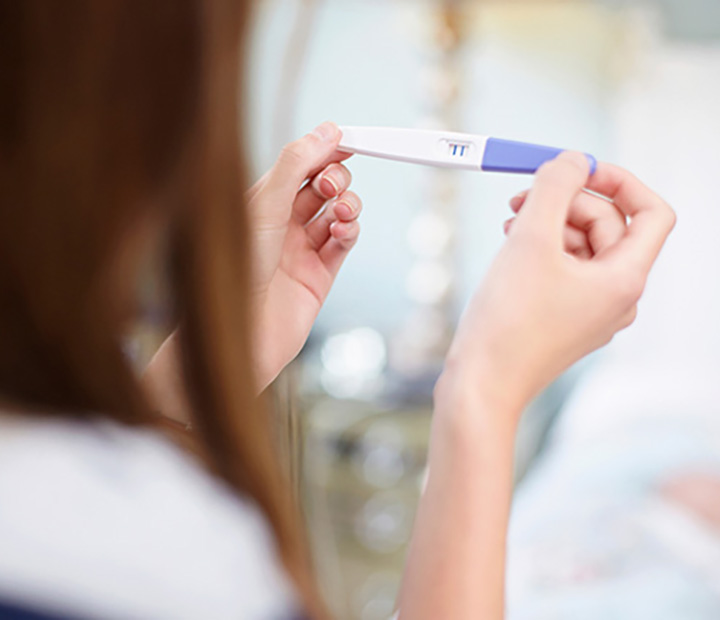Heartburn During Pregnancy: Causes and Treatment
Struggling with that burning sensation in your chest? Heartburn during pregnancy is a common but frustrating symptom that can start as early as the first trimester and often worsens as your baby grows. If you're wondering, “What does heartburn feel like when you’re pregnant?” it’s typically a burning pain in the chest or throat, often after eating or when lying down. Read on to learn more about heartburn during pregnancy, including when it starts, what causes it, how to prevent it, plus treatment options.
What Is Heartburn?
If you’ve never had heartburn before, you might think it has something to do with your heart. Actually, it has nothing to do with the heart! Heartburn happens when the contents of your stomach flow backward up into your esophagus (the tube that connects the stomach to the throat). Sometimes heartburn is referred to as acid reflux.
Because the acids from your stomach irritate your esophagus, when you have heartburn you feel a burning sensation in your throat and chest at the heart level, hence the name.
It’s estimated that between 30 and 80% of pregnant people experience heartburn at some point during pregnancy. For some, pregnancy might be the first time they experience heartburn.
Heartburn Vs. Acid Reflux Vs. GERD
It’s common to confuse heartburn, acid reflux, and gastroesophageal reflux disease (GERD) with one another, and wonder “Is acid reflux the same as heartburn?” Understanding the differences between them can help you manage it more effectively during your pregnancy:
Acid reflux. This occurs when stomach acid flows back into the esophagus, the tube connecting your throat to your stomach. Common symptoms include a burning sensation in the chest (heartburn) and regurgitation of food or sour liquid.
Heartburn. Heartburn is a symptom of acid reflux, described as a burning sensation in the chest that often occurs after eating or when lying down. It's important to understand that while heartburn is a common symptom of acid reflux, not every episode of acid reflux leads to heartburn.
GERD. When acid reflux becomes chronic, occurring more than twice a week during pregnancy, it may be diagnosed as GERD. This condition can lead to more severe symptoms such as difficulty swallowing, chronic cough, or chest pain, and may require medical intervention to prevent complications.
Although all three are connected, understanding the differences between heartburn, acid reflux, and GERD can help identify the severity of your symptoms and guide you in choosing the best course of action during your pregnancy.
When Does Heartburn Start in Pregnancy?
Heartburn can happen at any stage of your pregnancy, including the first trimester, but it’s more common as the pregnancy advances, particularly in the third trimester. This increased occurrence is due to the growing uterus, which exerts more pressure on the stomach, raising the likelihood of acid reflux.
What Does Heartburn Feel Like? Symptoms During Pregnancy
Experiencing heartburn during pregnancy is a common occurrence, affecting many parents-to-be. So, where do you feel heartburn, and what are the common symptoms of this type of acid reflux? Here’s what you might feel:
Burning sensation in the chest. A burning, acidic feeling that starts behind the breastbone and can rise toward the throat.
Regurgitation. A sour or bitter taste in the mouth due to stomach acid or swallowed food coming back up.
Increased discomfort when lying down. Symptoms of heartburn often worsen when reclining or after meals.
You may also feel bloated, notice more burping, or feel nauseous with heartburn.
Another common question is, “Can heartburn cause chest pain?” The burning sensation commonly associated with heartburn can sometimes feel like pain. Some individuals even report that heartburn can feel like a heart attack or angina. If you experience chest pain, look for other signs of heartburn. If you're uncertain whether the pain is due to heartburn or something else, it’s important to contact your healthcare provider right away.
What Causes Heartburn During Pregnancy?
Wondering “Why do I get heartburn?” Heartburn is most likely to strike at certain times during pregnancy when certain changes take place in your body:
During the first trimester, a surge in pregnancy hormones can cause your digestive system to slow down in order for nutrients to absorb more slowly into your bloodstream and eventually get to your baby. This means it takes longer for your stomach to empty, sometimes leading to indigestion and heartburn. Pregnancy hormones also relax the valve between your stomach and esophagus, so acid is more likely to leak into your esophagus.
Then, as your pregnancy progresses into the third trimester, your growing uterus pushes your stomach higher up. This pressure on your stomach can force stomach acids back up into your esophagus, leading to heartburn.
What Food Causes Heartburn?
Certain foods can increase the likelihood of heartburn, including:
Fatty, greasy, or fried foods
Coffee and tea
Chocolate
Peppermint
Alcohol
Carbonated soft drinks
Sweet foods
Acidic foods like citrus fruits, juices, tomatoes, and red peppers
Spicy and highly spiced foods.
Take note of which foods are triggering your heartburn during pregnancy and try to avoid them.
How to Prevent Heartburn During Pregnancy
Here are 10 tips for preventing heartburn during your pregnancy:
Eat smaller, more frequent meals, such as five or six small meals spaced out over the course of the day versus the typical three square meals.
Although you’re probably already avoiding certain foods during your pregnancy, consider avoiding the foods listed in our section above, as they are known to trigger heartburn
Some foods to help prevent heartburn during pregnancy or offer some relief include yogurt or milk, honey in warm milk, or chewing gum (which may help neutralize acid).
Eat slowly and chew thoroughly.
Drink lots of fluids, especially water.
Drink between meals and not during them.
Avoid slouching, especially during mealtimes, as it can put pressure on your stomach.
Wait at least an hour after eating before lying down.
Avoid eating and drinking three hours before bedtime—an empty stomach produces less acid, so heartburn is less likely to occur and disrupt your sleep.
Avoid movements that might exacerbate heartburn, such as bending over at your waist—instead bend with your knees.
When lying down or sleeping, prop yourself up with pillows so that your head, neck, and shoulders are elevated. You might even consider raising the head of the bed four to six inches with a stack of books or wood blocks. Using a wedge-shaped pillow to prop you up can also help prevent heartburn.
How to Treat Heartburn During Pregnancy
The prevention measures listed above may help relieve your symptoms, but if your heartburn is causing a lot of discomfort, contact your healthcare provider for their recommended heartburn treatment. They may recommend a specific medicine for heartburn. Don’t take antacids or acid blockers without checking with your provider first.
Most over-the-counter antacids are safe to use during pregnancy, but you'll want to avoid those that contain aluminum or aspirin. Some antacids have high levels of sodium and can increase fluid retention or worsen constipation. This is why it’s best to consult your provider first about which medication or heartburn treatment is safe for you while pregnant.
While you’re here, register to watch our free online birthing classes. There are 11 free classes with expert advice and real-life experiences from parents-to-be.
Is Heartburn Dangerous During Pregnancy?
Although heartburn may be uncomfortable during pregnancy or at any point, it’s generally not dangerous. If you are experiencing severe or persistent heartburn during pregnancy, it's important to know that this is generally normal due to the hormonal and physical changes your body is undergoing. Most likely, the heartburn will subside after you give birth, especially if you did not have this issue prior to your pregnancy.
You can try some of our prevention and treatment methods listed below to help ease your symptoms; however, if your heartburn persists or is severe, contact your healthcare provider for more advice. Chronic heartburn can sometimes lead to damage to the esophagus lining.
When to Contact Your Healthcare Provider
As we mentioned above, if you’ve tried various lifestyle changes and prevention measures but your heartburn is still bothering you, contact your healthcare provider for treatment options.
It’s also best to contact your provider if you experience the following:
waking up at night because of your heartburn
difficulty swallowing
spitting up blood
your stools are black
you’re losing weight
experiencing bad chest pain.
The Bottom Line
Heartburn can be an annoying sensation, especially if you’re already dealing with a lot of other pregnancy symptoms. Luckily, there are effective ways to help prevent and treat heartburn.
You can start by making a few changes to your diet and eating smaller meals spaced throughout the day. If heartburn tends to strike at night, propping yourself up and not eating in the hours before bed can help prevent it.
If home remedies don’t help, contact your healthcare provider, who can recommend a safe over-the-counter antacid.
Soon enough, you’ll be holding your baby in your arms, and heartburn—as well as other pesky pregnancy symptoms—will be a distant memory!
If you want exclusive rewards and discounts on your Pampers purchases, download the Pampers Rewards App today.
How We Wrote This Article The information in this article is based on the expert advice found in trusted medical and government sources, such as the American Academy of Pediatrics and the American College of Obstetricians and Gynecologists. You can find a full list of sources used for this article below. The content on this page should not replace professional medical advice. Always consult medical professionals for full diagnosis and treatment.
Join a World of Support
through Pregnancy and Parenthood.
TRACK WITH TOOLS
LEARN WITH EXPERTS
GET REWARDED













